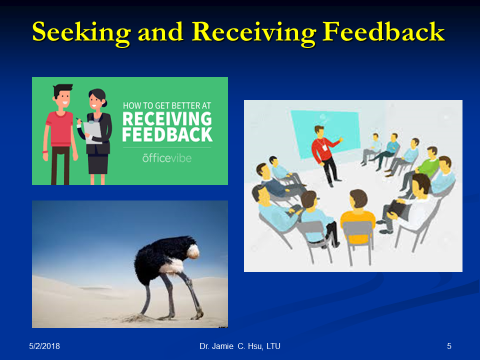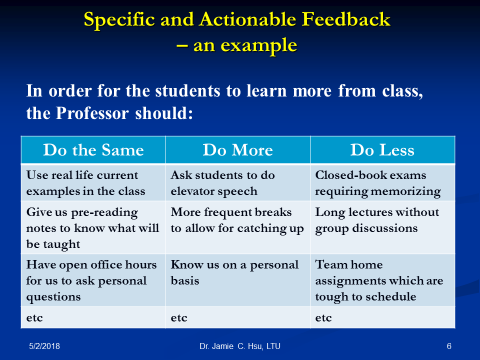
Seeking and Receiving Feedback
– Musings of Dr. Jamie C. Hsu, 5.6.2018
In order to improve ourselves, we need to continuously seek feedback from people we interact with. This could include our family, friends, colleagues, students, or bosses. Anyone we work and interact with can give us feedback (bad, good or neutral), and some of it may surprise us. We can’t just bury our heads in the sand and assume we know how others feel about us.
There are many good articles and books that teach us how to give constructive criticism or receive feedback graciously. But most of the teaching and training tends to be complicated with a mix of psychology, human behavior, and communication skills. The complexity may discourage people from trying and learning.
One simple and effective way I have tried over the years when leading large organizations, teaching students, and consulting, is to get a One-Pager of Feedback as depicted in the accompanying chart. The purpose of the chart is to ask this simple and neutral question: In order for me to be a more effective teacher/leader/colleague/parent, I should do more, do less, or do the same of the suggested items.
The attached chart is an example of the feedback I received from an MBA class. The details are not important, but you can see that the list of items are specific, actionable, and non-judgmental. It is not like many general surveys asking you to give ratings from 1 to 10, which do not reveal much about the why and what. It is also different from surveys which prompt you to list your likes and dislikes. Both kinds of surveys either do not provide useful information or they may hurt the feelings of the recipient and cause defensiveness.
You may want to try this “do more, do less, and do the same” survey with your family members to learn how you can create a healthy and happy family. Or you can ask your colleagues how you can be a more valuable team member with a similar approach. I am sure you’ll find many suggestions for you to improve upon, without being discouraged by any negative ratings and comments.
Please develop and keep such a list for your journey of continuous improvement.


如何尋求並接受有效的反饋
-作者 許俊宸博士
-中譯 薛乃綺
為了成為更好的人,我們需要持續地與自己有所互動的人尋求反饋。這可能包括我們的家人、 朋友、同事、學生或老闆。我們在工作中和周遭有所互動的任何人,可能會給予一些回饋,不論是負評、好評、甚至是中立的,也許會讓你感到訝異。我們不能因此將頭埋在沙堆裡,而自認為我們知道別人對自己的看法。
有許多很好的文章及書籍,教我們要如何給予建設性的批評或慷慨地接受別人回饋的意見。但多數的教學或訓練往往因為混合了心理學、行為學、及溝通技巧而變得複雜。這樣的複雜度也可能成為阻礙人們想要嘗試或學習的原因。
這些年來,我在領導大型組織、或教導學生、或進行諮詢的過程中,都曾嘗試過一種簡單且有效的方式,就是拿一張只有一頁如附圖所示的回饋單。這張表的目的,就是要問這個簡單而中立的問題:為了讓我成為更有效的老師 / 領導者 / 同事 / 父母親,那些建議項目我應該要做得更多?更少?或維持不變?
附圖是我在MBA課程中所收到的一個反饋的例子。細節並不重要,但你可以發現這些項目列表是具體的、可操作的、且不預設任何立場的。這不像一般的調查那樣,要求你給出1到10的評分,當中並未透露出太多的原因與內容。它也不同於其他類型的調查,去提示你列出自己的喜惡。上述這兩種調查既沒有提供有用的訊息,也可能讓對方感到不舒服、進而產生防禦的心態。
你也許想要嘗試跟家人一起進行這種”做得更多?更少?或維持不變?”的調查,以了解如何創造一個健康和幸福的家庭。或者你可以問問你的同事,如何以類似的方式成為更有價值的團隊成員。我相信你會得到許多改進的建議,而不會因任何負評或評論而感到灰心。
請用这简单的方法,来開創並踏上這條讓自己持續不斷向上的旅程吧!


